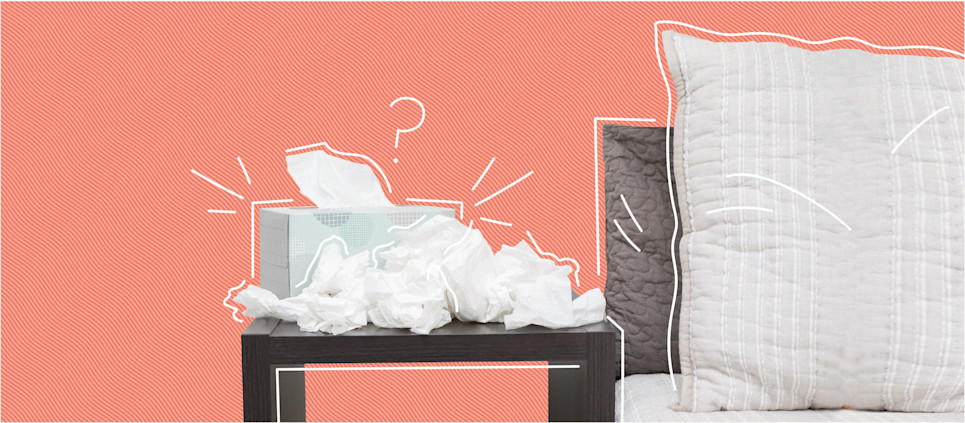How to keep your home healthy when a roommate is sick
The COVID-19 pandemic has everyone thinking about the spread of germs a little more carefully. Whether you or your roommate has COVID-19 or just a run-of-the-mill sore throat, it’s a good idea to learn the best practices for staying healthy when you’re sharing a living space with the person who is ill—and prevent future infection.

Table of contents
Stay home if someone is sickIsolate the sick person as much as possibleDon’t forget to handle trash with carePractice strict hand hygieneDeep clean once the person has recoveredPrevent infection by keeping your space cleanStay home if someone is sick
If someone in your household catches a virus, they should stay home until they feel better. If someone in your household has the coronavirus or believes they do, everyone in the home should stay home and self-isolate for 14 days—if one roommate has the virus, everyone else has been exposed, too. If someone has an illness that isn’t COVID-19, they should still stay home to avoid getting others sick.
Isolate the sick person as much as possible
The most important way to prevent the spread of germs within your household is to avoid close contact with the sick person—especially if you know or suspect they have COVID-19. The novel coronavirus spreads primarily via respiratory droplets which are emitted when the sick person is breathing, talking, sneezing, or coughing. The droplets can land in the eyes, noses, and mouths of nearby people or on surfaces where people can come into contact with them through touch.
That means the sick person should stay in their room with the door closed. If they can use a separate bathroom, they should, and no one else in the home should use that bathroom while the person is sick. If someone in the household is caring for the sick person by bringing them food, they should leave the food at the sick person’s door, then walk away. The sick person can then take the food inside their room, eat it there, and wash their dishes in the separate bathroom so as not to spread germs to the kitchen.
If your home only has one bathroom, when the sick person needs to eat or use the bathroom, they should let the other roommates know so they can make themselves scarce. Everyone in the house should follow these additional precautions:
The sick person should wear a mask and gloves, if possible, when using the common areas.
The sick person should use separate towels in the kitchen and bathroom.
Airflow is important for preventing the spread of the coronavirus, so if possible, the sick person should open the windows when they’re using these common areas.
Everyone should close the lid to the toilet before they flush.
When the sick person is done using the bathroom or the kitchen, they should clean surfaces they touched using a standard household disinfectant.
Don’t forget to handle trash with care
A sick person will likely generate trash like used tissues that can spread germs. Make sure the person has their own lined trash can, double-bag that trash, and let it sit in their room for 72 hours before taking it to the dumpster. Same goes for trash that contains used gloves, disposable masks, and disposable wipes. Wash your hands with soap and water for 20 seconds after taking the trash out, and don’t forget to disinfect the doorknobs afterwards, too.
Practice strict hand hygiene
Even if you’re not in contact with someone who’s sick, a great way to prevent catching any virus yourself is to wash your hands frequently and avoid touching your eyes, nose, and mouth. Clean your hands for 20 seconds using soap and warm water, making sure to scrub every surface including between your fingers and under your fingernails. Then dry your hands thoroughly with a cloth towel to avoid skin irritation, which can result from moisture being left on your hands. If you’re out and about, bring a bottle of at least 70% alcohol based hand sanitizer and use it frequently.
Deep clean once the person has recovered
Once the person is feeling better (two weeks after the person began showing symptoms, if the person has COVID), make sure you deep clean your space to rid common areas of lingering germs.
Prevent infection by keeping your space clean
Especially if you live in a dense city, frequent cleaning can help keep pathogens at bay.
Routinely disinfect surfaces like countertops, doorknobs, light switches, and faucets—once a day or once every other day.
Disinfect your phone every time you come into the house (or, at minimum, at the end of the day).
Change out hand towels in the kitchen and bathroom once every two days or so, and make sure when you do laundry, you carry it in a container like a bag or basket rather than your arms.
Mop the floors once a week, and keep shoes near the front door.
Launder couch and armchair covers once a month or once every two months—if the covers aren’t removable, you can rent a fabric steam cleaner from your local hardware store.
Even after the pandemic is over, cold and flu season will rear its head every year. Staying home, washing your hands, and isolating a sick roommate will always be the best plan of attack when viruses go on the defense.
Bungalow offers affordable private rooms in beautiful shared homes in 10 cities nationwide—and the best roommates to share them with. Unlike other shared housing options, Bungalow vets all residents and helps you match with roommates who share your living preferences and interests. When you move in, monthly cleaning service is already on the books, to help your home stay healthy and happy. Find a Bungalow near you.
Ready to find your next home?
Move-in ready homes and a built-in community so you can feel at home, together — wherever you are.
Suggested articles



